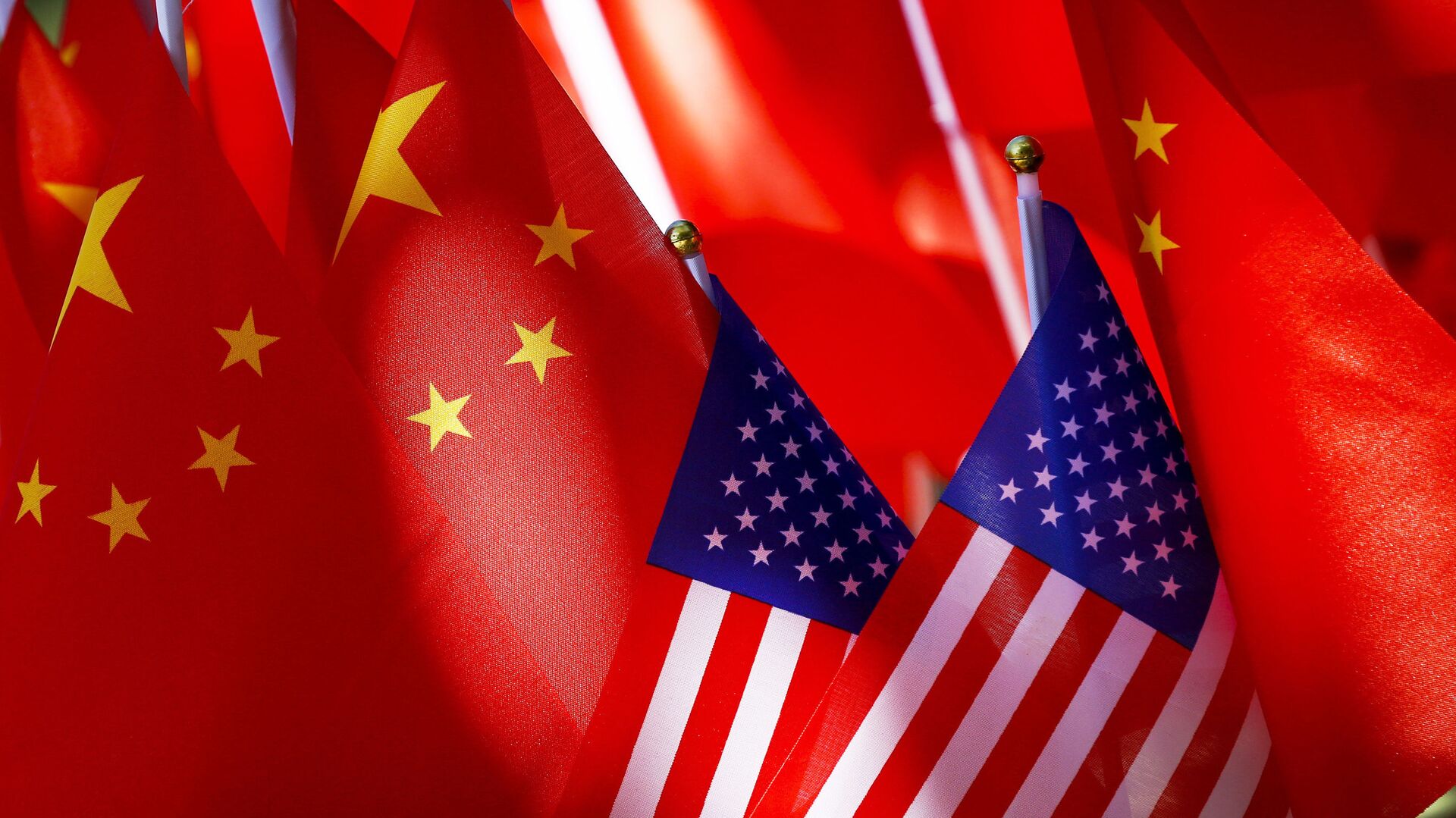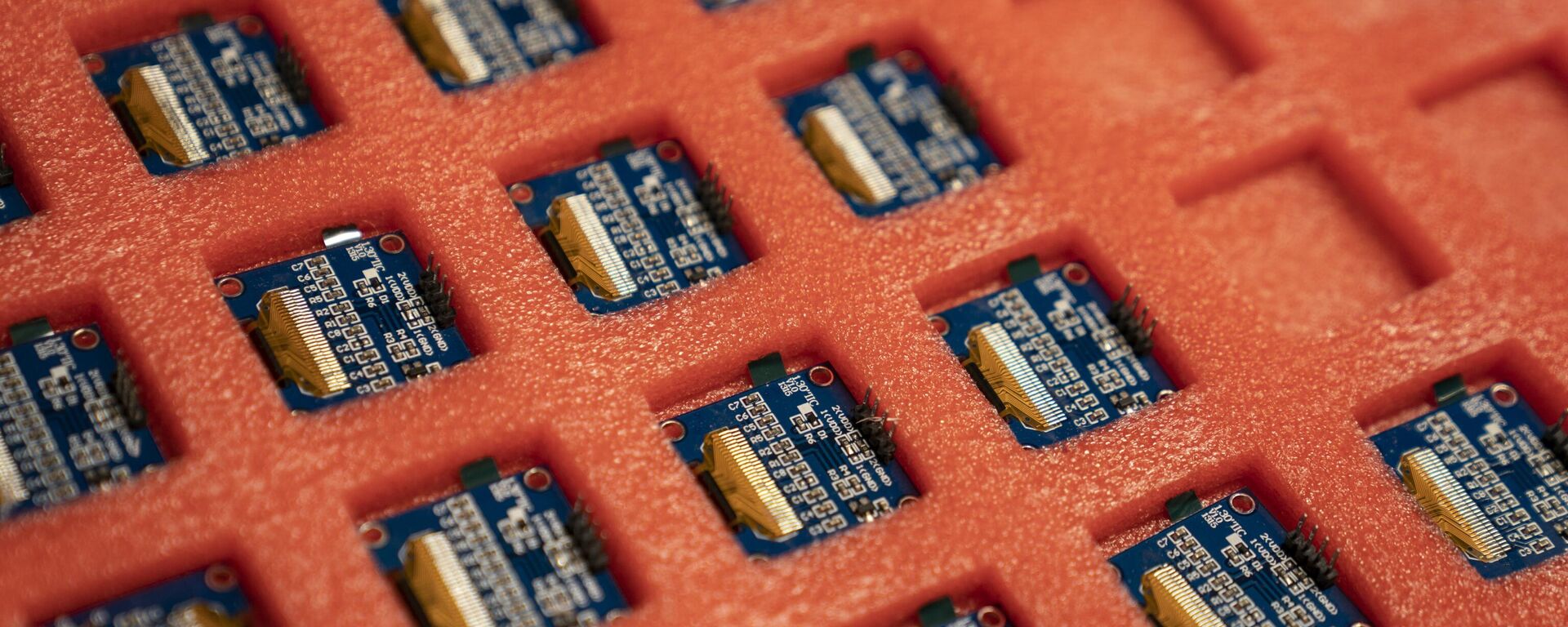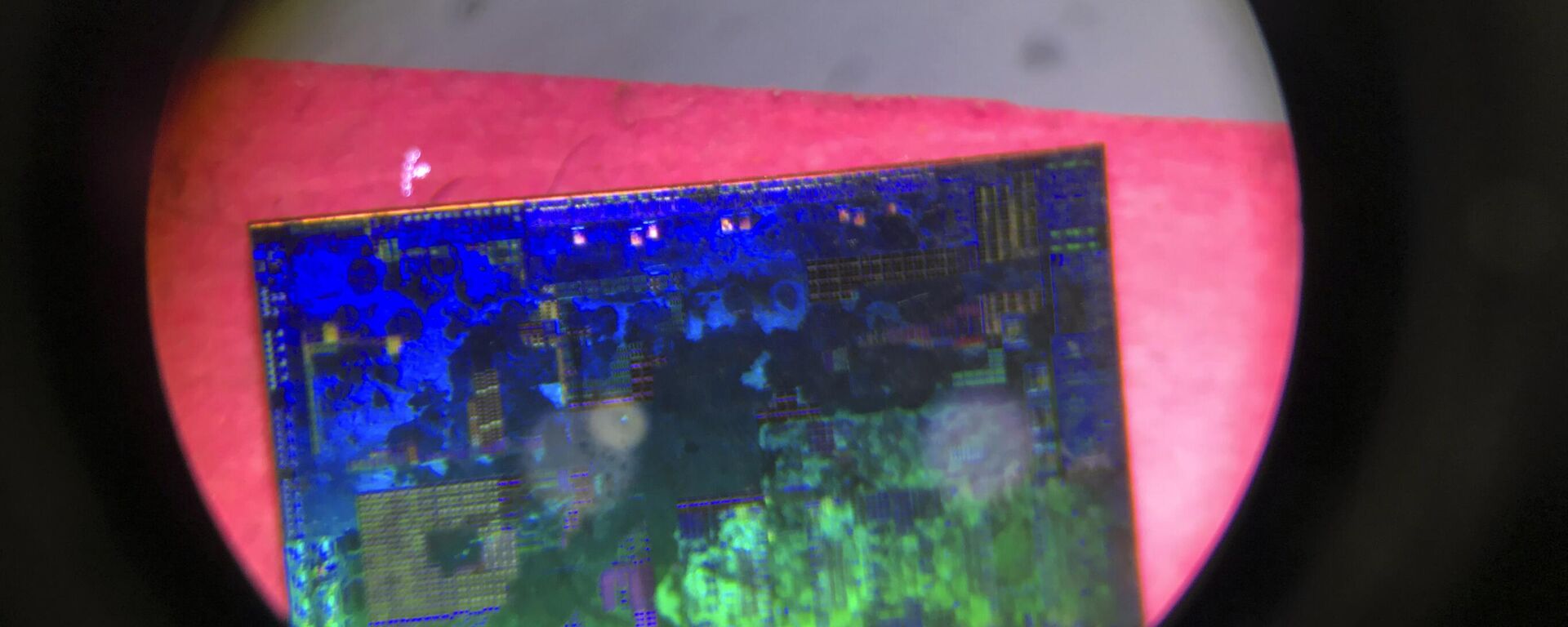https://sputnikglobe.com/20230828/why-us-commerce-secretarys-visit-to-china-unlikely-to-break-ice-1112945786.html
Why US Commerce Secretary's Visit to China Unlikely to Break Ice
Why US Commerce Secretary's Visit to China Unlikely to Break Ice
Sputnik International
US Commerce Secretary Gina Raimondo embarked on a trip to Beijing on Sunday to stress the importance of Sino-American economic ties in the aftermath of new curbs against the People's Republic introduced by President Joe Biden earlier this month.
2023-08-28T13:37+0000
2023-08-28T13:37+0000
2023-08-28T13:37+0000
us
world
joe biden
donald trump
janet yellen
china
beijing
washington
brics
intel
https://cdn1.img.sputnikglobe.com/img/07e5/02/0b/1082049363_0:140:2687:1651_1920x0_80_0_0_ed7b8c4934cf65905175bc1c9d511d3d.jpg
Commerce Secretary Raimondo met with the Chinese officials and business leaders on Monday."We share $700bn dollars of trade and I concur with you that it is profoundly important that we have a stable economic relationship," the US commerce secretary asserted to her Chinese counterparts. "It’s a challenging relationship, we will of course disagree on certain issues, but I believe we can make progress if we are direct, open and practical."As per the US official, Washington and Beijing have "worked over the summer to establish new information exchanges and working groups" on export controls and commercial issues "that will enable us to have more consistent engagement in our relationship." The effort is aimed at reviving US-China communication channels which shriveled away in the aftermath of the "spy balloon" scandal instigated by Washington.Raimondo specified, however, that when it comes to matters of "national security," there would be no room to compromise or negotiate, citing recent US investment cuts and measures restricting transfers of semiconductor, AI and other critical technologies to the PRC. According to the US press, the commerce secretary needs to convince her Chinese peers that these restrictions are aimed at protecting US domestic security, not holding China's economy back.Why China Doesn't Believe US 'Good Intentions'It's doubtful, though, that Beijing would believe Washington's assertions that the US trade bans have nothing to do with the containment of China. Judging from Chairman Xi Xinping's remarks, delivered on the first day of the 15th BRICS Summit in South Africa, the People's Republic is deeply concerned about US "hegemonism" and attempts to hinder the development of other global players through sanctions and weaponization of the dollar.Raimondo's China trip comes at a time when Sino-American relations are near a new low amid the ongoing trade battle. Following in the footsteps of his predecessor, Donald Trump, President Joe Biden keeps rolling out new measures curbing China's high-tech industries. The US administration slapped export controls on China’s access to advanced chips; banned US semiconductor firms from accepting federal funds from making new investments in China's hi-tech sector; and prohibited private equity and venture capital companies from funding in China's quantum computing and advanced semiconductor sector.For its part, Beijing resorted to asymmetric tit-for-tat measures: reportedly, China "scuttled" a $5.4 billion microchip deal envisioning Intel's acquisition of Tower Semiconductor, an Israeli chip maker; placed restrictions on US chip-maker Micron; and restricted exports of rare earth minerals, critical for the semiconductor production. In addition, the US mainstream press complains about difficulties faced by some American firms operating in China.Apart from the ongoing trade war, the US is continuing to beef up its presence in the Asia-Indo-Pacific region, form new partnerships and alliances and boost existing ones. US military officials don't conceal that their primary aim in the region is to "deter" China, Russia, and North Korea.The US bellicose rhetoric and speeded-up arming of Taiwan add to Beijing's concerns, given that China regards the island as its inalienable territory.US observers suggest that the negative public opinion largely reflects the US hawkish rhetoric concerning Beijing, given that the two major economies have not been involved in actual conflicts and confrontations.Raimondo's China trip is yet another high-profile visit by Biden administration officials to the People's Republic. Earlier, Treasury Secretary Janet Yellen, Secretary of State Antony Blinken and climate czar John Kerry visited the Asian giant.Neither of the charm offensives produced tangible results as tit-for-tats are ongoing. In addition, the Biden administration is escalating rhetoric by sending mixed signals, issuing threats and insulting remarks towards China and its leadership. This definitely does not make matters easier. Thus, unsurprisingly, no high-level Chinese officials have visited the US this year.China's Emerging Global South RoleMeanwhile, China is intensifying its cooperation with Russia and countries of the Global South. Beijing hailed the recent expansion of BRICS, which initially consisted of Brazil, Russia, India, China and South Africa. Having extended invitations to Saudi Arabia, the United Arab Emirates (UAE), Iran, Argentina, Egypt, and Ethiopia, BRICS is set to become an 11-member group. After expanding its geography, the group is set to expand its logistics routes and reinvigorate intra-Eurasia trade as well as Eurasia's trade with Africa. The move offers new business opportunities to BRICS members and improves their economic security.Beijing is also improving its domestic investment climate to counterbalance the US' aggressive anti-China measures. In mid-August, the State Council of the People's Republic of China outlined a set of measures aimed at six areas, including ensuring national treatment for foreign-backed enterprises and strengthening the protection of foreign investment. China’s support for its equities market and the US Federal Reserve’s intent to raise interest rates again have added to Asian stocks being on the rise on Monday.The unfolding developments show that the US attempts to twist China's arm into making concessions or hinder its technological rise hardly work amid the emergence of a multipolar world order.
https://sputnikglobe.com/20230828/us-commerce-secretary-arrives-in-china-on-4-day-visit-to-discuss-cooperation---reports-1112936863.html
https://sputnikglobe.com/20230522/beijing-banning-micron-means-china-has-mastered-chip-making-1110523565.html
https://sputnikglobe.com/20230803/chinas-rare-earth-metals-ban-hits-us-chip-trade-restrictions-where-it-hurts-1112340326.html
https://sputnikglobe.com/20230825/pepe-escobar-brics-11---strategic-tour-de-force-1112882830.html
china
beijing
washington
taiwan
Sputnik International
feedback@sputniknews.com
+74956456601
MIA „Rosiya Segodnya“
2023
News
en_EN
Sputnik International
feedback@sputniknews.com
+74956456601
MIA „Rosiya Segodnya“
Sputnik International
feedback@sputniknews.com
+74956456601
MIA „Rosiya Segodnya“
gine raimondo, raimondo trip to china, raimondo visit to china, us national security, us export bans, us export of semiconductors, chips act, joe biden executive order investment, us-china relations, us semiconductors, curbs on us investment in china, chip-makers, rare earth minerals, china export ban on rare earths, china micron, us-china tit-for-tat, us-china trade war, taiwan, us military aid taiwan
gine raimondo, raimondo trip to china, raimondo visit to china, us national security, us export bans, us export of semiconductors, chips act, joe biden executive order investment, us-china relations, us semiconductors, curbs on us investment in china, chip-makers, rare earth minerals, china export ban on rare earths, china micron, us-china tit-for-tat, us-china trade war, taiwan, us military aid taiwan
Why US Commerce Secretary's Visit to China Unlikely to Break Ice
US Commerce Secretary Gina Raimondo embarked on a trip to Beijing on Sunday to stress the importance of Sino-American economic ties in the aftermath of new curbs against the People's Republic introduced by President Joe Biden earlier this month.
Commerce Secretary Raimondo met with the Chinese officials and business leaders on Monday.
"We share $700bn dollars of trade and I concur with you that it is profoundly important that we have a stable economic relationship," the US commerce secretary asserted to her Chinese counterparts. "It’s a challenging relationship, we will of course disagree on certain issues, but I believe we can make progress if we are direct, open and practical."
In a bid to mend fences, Raimondo argued that the export controls introduced by the Biden administration cover just 1% of mutual trade between the two major economies. At the same time, there are a plethora of other areas in which the US and the People's Republic of China (PRC) could maintain mutually-beneficial cooperation, according to her. Exports to China support over 80,000 jobs in the United States with the People's Republic remaining America's third-largest export market, she stressed.
As per the US official, Washington and Beijing have "worked over the summer to establish new information exchanges and working groups" on export controls and commercial issues "that will enable us to have more consistent engagement in our relationship." The effort is aimed at reviving US-China communication channels which shriveled away in the aftermath of the "spy balloon" scandal instigated by Washington.
Raimondo specified, however, that when it comes to matters of "national security," there would be no room to compromise or negotiate, citing recent US investment cuts and measures restricting transfers of semiconductor, AI and other critical technologies to the PRC. According to the US press, the commerce secretary needs to convince her Chinese peers that these restrictions are aimed at protecting US domestic security, not holding China's economy back.
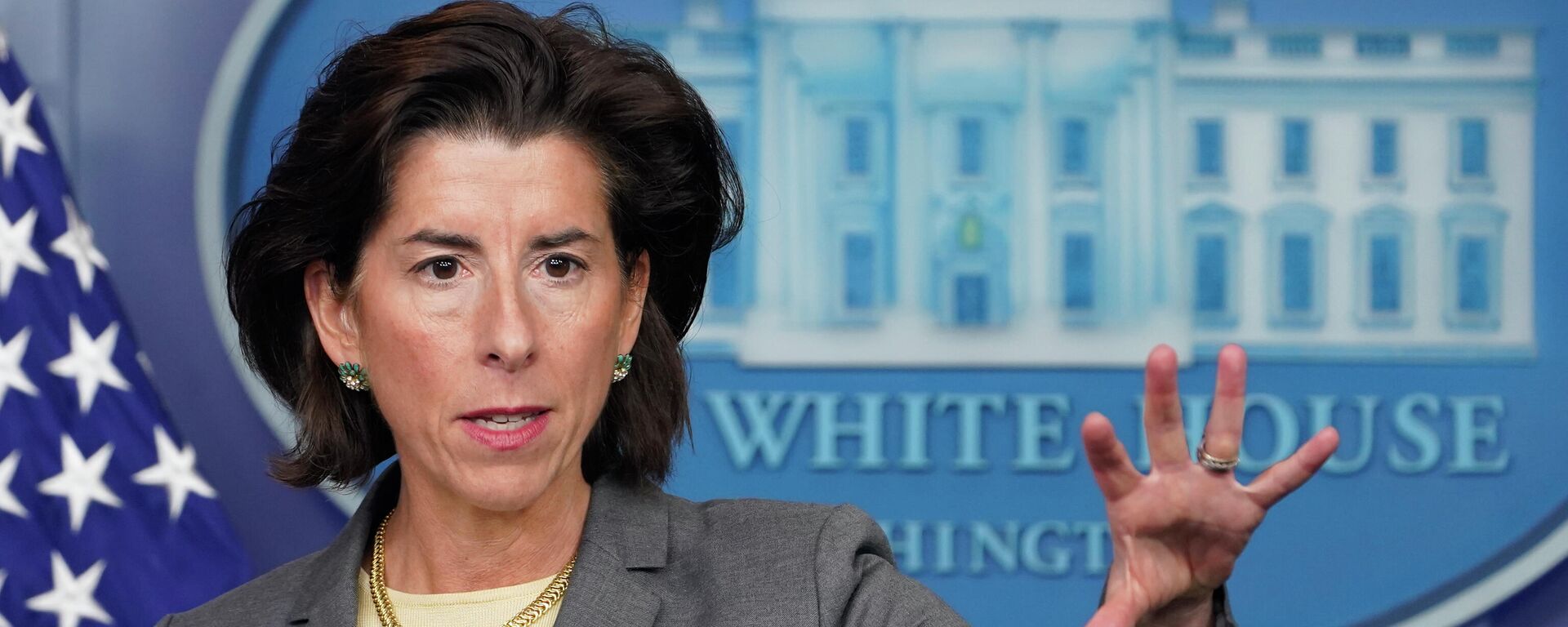
28 August 2023, 01:18 GMT
Why China Doesn't Believe US 'Good Intentions'
It's doubtful, though, that Beijing would believe Washington's assertions that the US trade bans have nothing to do with the containment of China. Judging from Chairman Xi Xinping's remarks, delivered on the first day of the 15th BRICS Summit in South Africa, the People's Republic is deeply concerned about US "hegemonism" and attempts to hinder the development of other global players through sanctions and weaponization of the dollar.
Raimondo's China trip comes at a time when Sino-American relations are near a new low amid the ongoing trade battle. Following in the footsteps of his predecessor, Donald Trump, President Joe Biden keeps rolling out new measures curbing China's high-tech industries. The US administration slapped export controls on China’s access to advanced chips; banned US semiconductor firms from accepting federal funds from making new investments in China's hi-tech sector; and prohibited private equity and venture capital companies from funding in China's quantum computing and advanced semiconductor sector.
For its part, Beijing resorted to asymmetric tit-for-tat measures: reportedly, China "scuttled" a $5.4 billion microchip deal envisioning Intel's acquisition of
Tower Semiconductor, an Israeli chip maker; placed restrictions on
US chip-maker Micron; and
restricted exports of rare earth minerals, critical for the semiconductor production. In addition, the US mainstream press complains about difficulties faced by some American firms operating in China.
Apart from the ongoing trade war, the US is continuing to beef up its presence in the Asia-Indo-Pacific region, form new partnerships and alliances and boost existing ones. US military officials don't conceal that their primary aim in the region is to "deter" China, Russia, and North Korea.
The US bellicose rhetoric and speeded-up arming of Taiwan add to Beijing's concerns, given that China regards the island as its inalienable territory.
What's more, a recent Ipsos poll indicated that over 40% of Americans expect that the US will engage in a direct military confrontation with China within the next five years, while 75% of respondents hold either a "very unfavorable" or "unfavorable" view of China. At the same time, nearly 50% of GOP respondents see China an "imminent threat," with 28% of Democrats sharing the same stance.
US observers suggest that the negative public opinion largely reflects the US hawkish rhetoric concerning Beijing, given that the two major economies have not been involved in actual conflicts and confrontations.
Raimondo's China trip is yet another high-profile visit by Biden administration officials to the People's Republic. Earlier,
Treasury Secretary Janet Yellen,
Secretary of State Antony Blinken and climate czar
John Kerry visited the Asian giant.
Neither of the charm offensives produced tangible results as tit-for-tats are ongoing. In addition, the Biden administration is escalating rhetoric by sending mixed signals, issuing threats and
insulting remarks towards China and its leadership. This definitely does not make matters easier. Thus, unsurprisingly,
no high-level Chinese officials have visited the US this year.China's Emerging Global South Role
Meanwhile, China is intensifying its cooperation with Russia and countries of the Global South. Beijing hailed the recent expansion of BRICS, which initially consisted of Brazil, Russia, India, China and South Africa.
Having extended invitations to
Saudi Arabia, the United Arab Emirates (UAE), Iran, Argentina, Egypt, and Ethiopia, BRICS is set to become an 11-member group. After expanding its geography, the group is set to expand its logistics routes and reinvigorate intra-Eurasia trade as well as Eurasia's trade with Africa. The move offers new business opportunities to BRICS members and improves
their economic security.
Beijing is also improving its
domestic investment climate to counterbalance the US' aggressive anti-China measures. In mid-August, the State Council of the People's Republic of China outlined a set of measures aimed at six areas, including ensuring national treatment for foreign-backed enterprises and strengthening the protection of foreign investment. China’s support for its equities market and the US Federal Reserve’s intent to raise interest rates again have added to
Asian stocks being on the rise on Monday.
The unfolding developments show that the US attempts to twist China's arm into making concessions or hinder its technological rise hardly work amid the emergence of a multipolar world order.
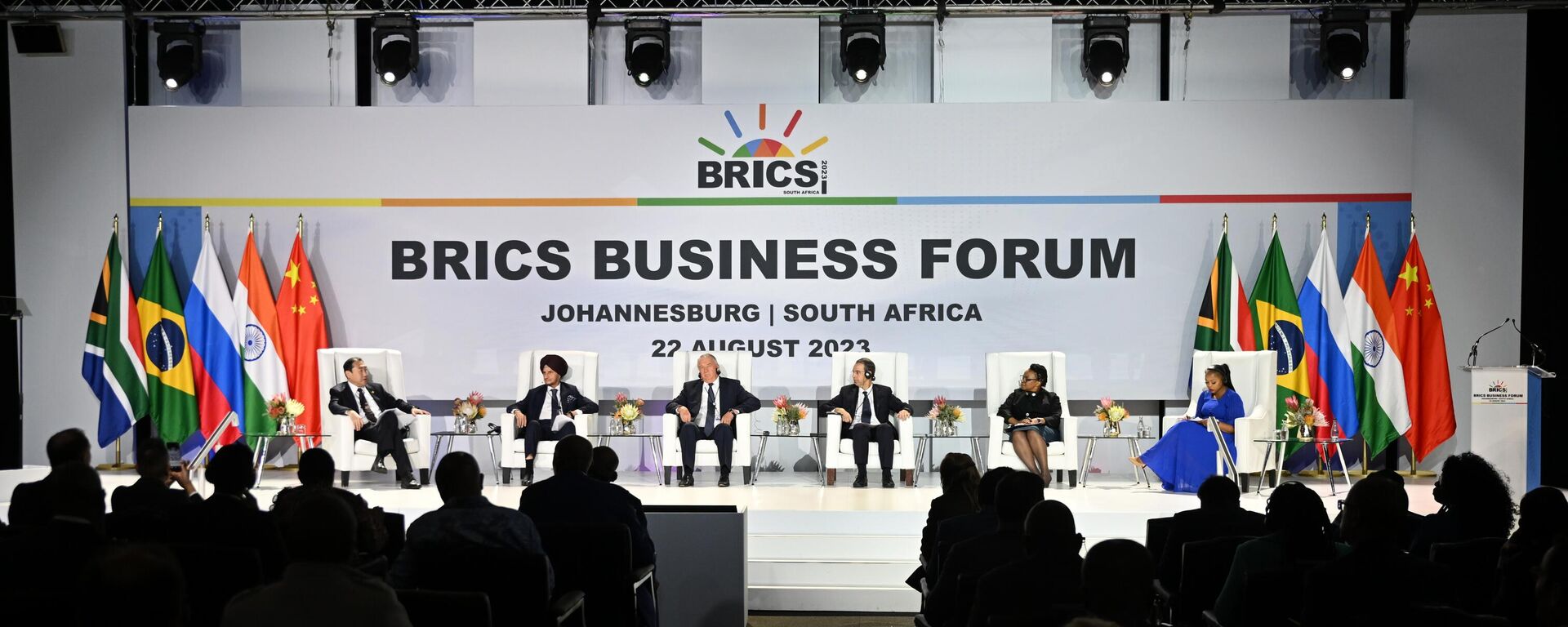
25 August 2023, 12:37 GMT
